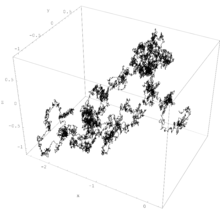
Back Markov-eienskap AF خاصية ماركوف Arabic Марковско свойство Bulgarian Propietat de Màrkov Catalan Markow-Eigenschaft German Propiedad de Márkov Spanish خاصیت مارکوف FA Propriété de Markov French Markovljevo svojstvo Croatian Proprietà di Markov Italian

In probability theory and statistics, the term Markov property refers to the memoryless property of a stochastic process, which means that its future evolution is independent of its history. It is named after the Russian mathematician Andrey Markov. The term strong Markov property is similar to the Markov property, except that the meaning of "present" is defined in terms of a random variable known as a stopping time.
The term Markov assumption is used to describe a model where the Markov property is assumed to hold, such as a hidden Markov model.
A Markov random field extends this property to two or more dimensions or to random variables defined for an interconnected network of items.[1] An example of a model for such a field is the Ising model.
A discrete-time stochastic process satisfying the Markov property is known as a Markov chain.
- ^ Dodge, Yadolah. (2006) The Oxford Dictionary of Statistical Terms, Oxford University Press. ISBN 0-19-850994-4